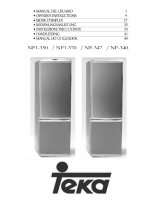CLEANING:
WHAT TO DO IN CASE OF A POWER OUTAGE:
➭ Before starting cleaning, switch the refrigerator off using the
switches.
➭ Clean the interior with water or bicarbonate of soda, with the
help of a sponge or cloth: this will prevent the formation of
odours.
➭ Never use steam cleaning machines, solvents or abrasive
detergents, which may damage the inside of your refrigerator. Do not place the
inside fittings in the dishwasher.
➭ From time to time clean the water trap and drain, using warm water with a few
drops of bleach.
➭ It is recommended that the rear grill be cleaned once year using a vacuum
cleaner: if it is dusty and dirty, that reduces the refrigerator’s performance and
increases its consumption.
➭ If possible, do not open the refrigerator doors.
➭ When power is restored, check to see if the food has unfrozen.
➭ Consume any defrosted food immediately. Do not re-freeze!
WHAT TO DO IF THE REFRIGERATOR IS NOT TO BE
USED FOR A LONG PERIOD OF TIME:
➭ Empty the refrigerator.
➭ Unplug and clean the unit as described above, and turn the light off at the switch.
➭ Leave the doors open to prevent formation of unwanted odours.
➭ Vacation function: If your refrigerator is not going to be used for a long period
but you wish to keep food frozen in the freezer, you can turn the refrigerator
section off and leave it closed: the appliance will continue to function with very
low consumption, without causing odours inside.
12
5. CLEANING AND MAINTENANCE
CHANGING THE LIGHT
➭ Turn the light switch off.
➭ Press the inside lip to remove the light reflector cover.
➭ Remove the bulb which has failed and replace it with another
of the same sort, screw type E14, 220-240V, with a maximum
of 15 W.




















